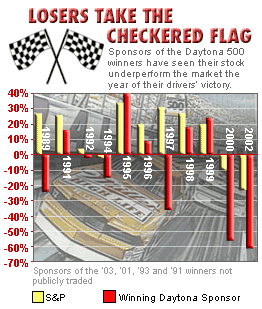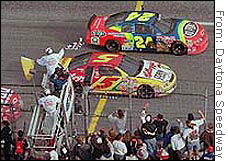
NEW YORK (CNN/Money) -
Budweiser, the sponsor of Daytona 500 winner Dale Earnhardt Jr., received some nice publicity Sunday. But shareholders of Anheuser-Busch, which owns Budweiser, might wish that someone else took the checkered flag.
That's because over the last 15 years, the winning sponsor of Nascar's biggest race of the year has been likely to see its stock lag the broader market during the following year. In fact, they have usually trailed by many laps.
Welcome to the Daytona 500 stock curse, joining the pantheon of dubious cause-and-effect market rules like the stadium sponsor curse and the Super Bowl indicator -- fun ways to link unrelated performances in sports and the stock market.

Since Darrell Waltrip, sponsored by Procter & Gamble's Tide, won the race in 1989, there have been only two years when the winning sponsor outperformed the market, and then only slightly. In 1995, Eastman Kodak narrowly outperformed the S&P 500 after it backed a winner, and 1999, DuPont beat the market after its second win.
In all the other years, the winning sponsor was a loser, and its stock lagged the market by an average 28 percent.
In 1997, Jeff Gordon's win saw his sponsor DuPont's stock fall 36 percent on the year, while the S&P gained 31 percent, one of three years the sponsors' stock fell in the midst of a bull market.
Bear markets didn't help -- Caterpillar fell 61 percent in 2002 after Ward Burton's win, far worse than the 23 percent fall in the S&P. (Watch out this year: The Super Bowl stock market indicator is predicting a bear market, since an old AFL team, the Patriots, won the big game.)
Coincidence? You be the judge
To be sure, it would be safer for a drivers' ed student to join a Nascar race than to base investment decisions on the outcome of any sporting event.
But at least one stock market analyst said it might not be a completely coincidental relation between sponsoring a Nascar winner and seeing your market fortunes run out of gas.

"There's a certain hubris in this kind of sponsorship that could indicate some overreaching by management," said Paul Macrae Montgomery, a money manager with Montgomery Capital. "Markets are cyclical. A company with that kind of spare cash might be at a point in their business cycle where they've already enjoyed the best."
A sponsorship of a Nascar team is relatively expensive -- somewhere between $8 million and $15 million for a full year, not counting the cost of commercials and the other marketing expenses that go into supporting the sponsorship. That's far more expensive than the typical $2 million a year that companies spend to put their name on an arena or stadium.
But I still think the stadium sponsor curse is more legitimate than the Daytona 500 curse.
| SportsBiz
|

|
| Click here for SI.com sports coverage
|
|
|
|
The stadium curse, which has seen 10 bankruptcies since the start of 2001, measures the stock performance of every major stadium or arena sponsor. The Daytona curse relies on a totally unrelated factor -- success on the race track -- to choose one sponsor to suffer the curse.
A Nascar spokesman laughed more than he cringed when told of the curse. He said that while he didn't anticipate forwarding this column to many sponsors, he wasn't worried about sponsors being scared away.
"Obviously, there are a variety of external and market force factors that play on a stock's trading price," said Nascar's Andrew Giangola. "We hope this year's winner will see a nice gain in their stock. But our sponsors are involved in Nascar to connect with the most brand-conscious and brand-loyal fans in all of sports."
But if the Daytona curse continues, perhaps sponsors should figure out a way to get race fans to buy their shares, not just their motor oil or their auto finishes. Fans could be given stock prospectus as part of their race track programs. Nascar sponsor mutual funds could be sold at kiosks at the various tracks.
Otherwise, Sunday's race might give us all a winner worth shorting in the year ahead.

|

